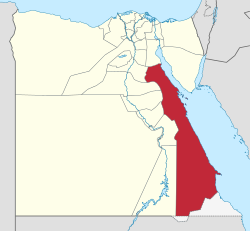An editor has nominated this article for deletion. You are welcome to participate in the deletion discussion , which will decide whether or not to retain it. |
| 2017 Hurghada attack | |
|---|---|
| Part of Sinai insurgency | |
 Location of Red Sea Governorate in Egypt | |
| Location | Hurghada, Red Sea Governorate, Egypt |
| Date | 14 July 2017 |
Attack type | stabbing |
| Deaths | 3 |
| Injured | 4 |
| Perpetrators | Abdel-Rahman Shaaban |
| Motive | Islamic extremism |
On 14 July 2017 Abdel-Rahman Shaaban, a former university student from the Nile Delta region, swam from a public beach to each of two resort hotel beaches at Hurghada on the Red Sea and stabbed five German, one Armenian and one Czech tourists, all women, killing two German women. The Czech tourist died on 27 July. The perpetrator shouted that the Egyptian hotel personnel who gave pursuit after the stabbings at the second beach should "Stay back, I am not after Egyptians". Nevertheless, hotel personnel pursued and captured the attacker.